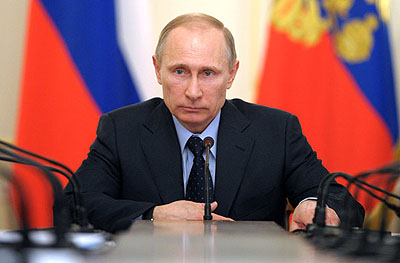Paul Krugman just left a conference in Dubai, and decided to write a bit about oil prices because all the geopolitical stuff he heard was pretty grim. But the oil stuff wasn’t that interesting. His one paragraph about geopolitics is:
My other thought is that Venezuela-with-nukes (Russia) keeps looking more vulnerable to crisis. Long-term interest rates at almost 13 percent, a plunging currency, and a lot of private-sector institutions with large foreign-currency debts. You might imagine that large foreign exchange reserves would allow the government to bail out those in trouble, but the markets evidently don’t think so. This is starting to look very serious.
Yes it is, and the reference to Venezuela-with-nukes is telling. A Russian economic crash could just be a crash. That would be bad for Russia, bad for Europe, and bad for the world. But it would hardly be the first  time a midsize economy crashed. It would be bad but manageable.
time a midsize economy crashed. It would be bad but manageable.
Except that Russia has Vladimir Putin, Russia has a pretty sizeable and fairly competent military, and Russia has nukes. Putin has spent his entire career building his domestic popularity partly by blaming the West for every setback suffered by the Russian people, and that anti-Western campaign has reached virulent proportions over the past year or two. If the Russian economy does crash, and Putin decides that the best way to ride it out is to demagogue Europe and the West as a way of deflecting popular anger away from his own ruinous policies, it’s hard to say what the consequences would be. When Argentina pursues a game plan like that, you end up with a messy court case and lots of diplomatic grandstanding. When Russia does it, things could go a lot further.
I have precious little sympathy for Putin, whose success—such as it is—is based on a toxic stew of insecurities and quixotic appetites that have expressed themselves in a destructive brand of crude nativism; reactionary bigotry; disdain for the rule of law, both domestic and international; narrow and myopic economic vision; and dependence on an outdated and illiberal oligarchy to retain power. Nonetheless, there are kernels of legitimate grievance buried in many of these impulses, as well as kernels of necessity given both Russia’s culture and the post-Cold War collapse of its economy that has left it perilously dependent on extractive industries.
I don’t know if it’s too late to use the kernels as building blocks to improve, if not actually repair, Western relations with Putin’s Russia. But it’s still worth trying. A Russian crash may or may not come, but it’s hardly out of the realm of possibility. And if it happens, even a modest rapprochement between East and West could help avoid a disastrous outcome.


















